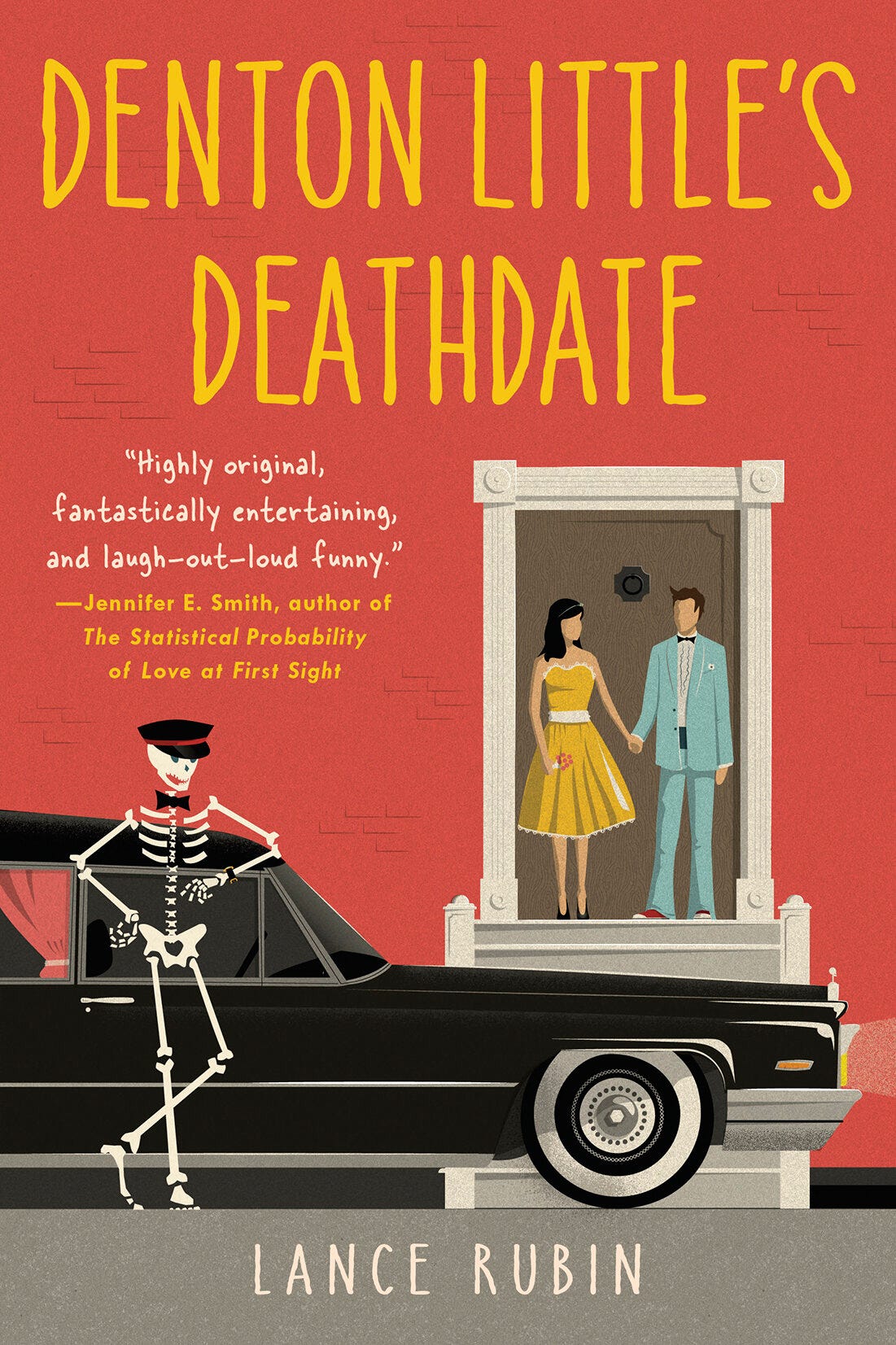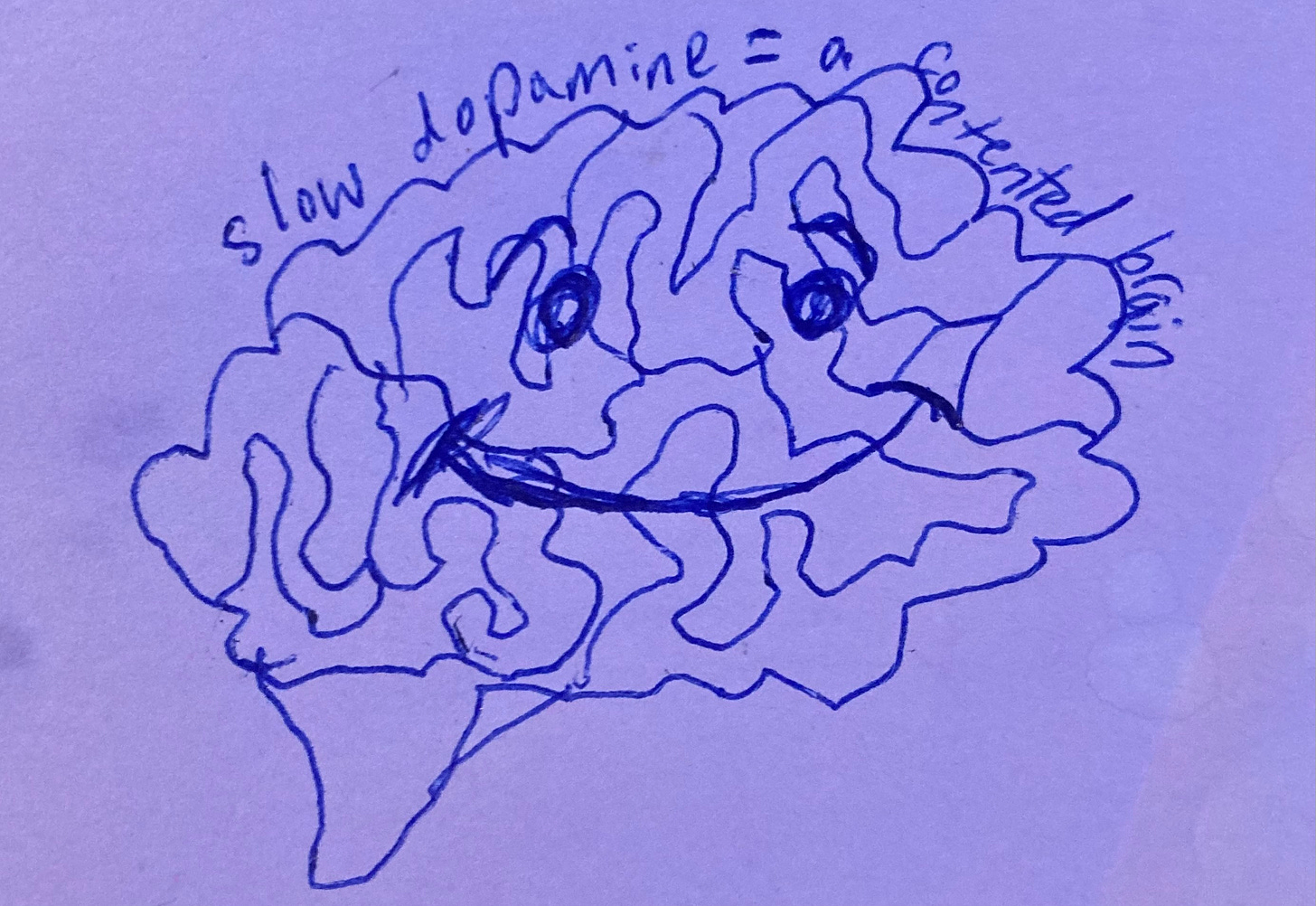Denton Little's finally dead. (Sort of.)
On celebrating our creative skins as we shed them.
Hey, everybody! Happy October to you! You didn’t hear from me last week because I was up to my eyes in Zed Moonstein Makes a Friend copy-edits (some day I’ll talk more in-depth about the copy-editing process from the writer’s perspective) but the upside is: you get to hear from me this week on a Tuesday! Whee!
Today I’m writing about one of the parts of author life that doesn’t usually get posted about on Instagram profiles or written about in newsletters: going out of print.
About a month ago, I learned from my publisher that, due to slowing sales, my first YA novel, Denton Little’s Deathdate, will no longer be printed. This means it will no longer be available in bookstores for people to purchase.
Yes, that’s right. Denton Little has finally died.
(Though he lives on in e-book and audiobook form! And in libraries where he’s circulating enough to justify keeping him around!)
There’s an obvious reason authors don’t feel motivated to publicly post about this moment. Because it’s a bummer! And it feels like you’re broadcasting something that is, if not failure exactly, definitely not success.
But, if this isn’t clear already, I don’t want my internet presence to be all shine and no smudge! I want to normalize failure. I want to normalize being transparent about the mess of it all. Because the mess is inevitable! That’s why I love interviewing people about their creative struggles; it’s so damn comforting to remember that this is hard for everyone.
The fact is, Denton Little’s Deathdate going out-of-print was not shocking news. The sequel, Denton Little’s Still Not Dead, actually went out-of-print first, in the summer of 2022. So I’m incredibly grateful Denton had as long a run as it did. Almost a decade!
This book—a dark high school comedy with a speculative edge—came out in April 2015, during a wildly different time, both in the world and in my life, and it has remained available to readers till now. That’s actually mind-boggling to me, and the word grateful can’t even properly capture my feelings. Writing this book completely shifted my career path and brought me more financial success than my acting career ever did. Denton Little saved me.
I started writing Denton in 2011 during a moment of desperation and uncertainty. After nursing dreams of being a professional actor since age eight, I had just hit some major walls—my Film/TV agent left his agency for a fancier one and didn’t bring with me him. Then I met with the other two agents at the agency to see if they wanted to represent me. I remember making a decision to be very honest with them in that meeting. “I can do a lot, but nobody seems to know what to do with me!” Being honest felt good, even though I couldn’t really tell how any of it was landing. My manager called the next morning: “They’ve decided to pass on working with you. And I think we should reassess our relationship as well.” Oof. It hadn’t landed well.
But as devastating as this rejection trifecta was, part of me felt relieved. I wasn’t actually enjoying the realities of being a professional actor. (And I truly sucked at auditioning on-camera, a story for another time.) But then what did that mean? This had been my plan since I was a kid! What else could I even do?
Right around then, I picked up The Hunger Games. I loved reading it—the pace, the heightened stakes, the darkness, the teen drama. I’d always loved teen dramas—Dawson’s Creek, Felicity, The OC—and I’d always dreamed of acting on one. My buddy Pete Capella and I even created a fully-improvised teen drama called The NYC that ran in comedy theaters from 2005 to 2007. (It didn’t lead to me getting cast on TV, but it did lead to me meeting a smart, hilarious actor named Katie Schorr.) (Who is now my wife. In case that was unclear.) I’d also always been a voracious reader, but my writing lived firmly in the realm of comedy sketches, musicals, plays, and comedic essays. Maybe a stab at a short story here and there. Writing novels never seriously entered my mind.
But reading The Hunger Games at that particular moment in time opened a new pathway in my brain. Maybe I could try writing…a YA novel. It helped that I had an idea already, one I’d been holding onto for about three years, thinking I’d write it as a screenplay that I could star in. It would be about a 20-something guy named Denton Little who lived in a world where everyone knew the day they would die. It would take place on his deathdate. It would be called Denton Little’s Deathdate.
That was literally as far as I got in three years of thinking about it. This was a pretty common thing for me back then, having ideas that excited me and not following through on them at all. I recently found an old journal entry from early 2011, before my agents and manager dumped me, where I said something like, “I really want to get better at following through on my writing projects.”
Welp! Looks like I got my shot. I decided that I would make the character of Denton Little a teenager. I started writing, feeling completely out-of-my-depth. But, pretty quickly, something happened. I was…having fun. I was enjoying myself. I was being creative. I was writing my teen drama dreams onto the page.
I’ll skip the long journey that followed, learning how to rewrite with the generous guidance of best buddy Zack Wagman, and getting a draft in solid enough shape that I was able to find a stellar agent, Mollie Glick (still my agent!), to represent me, and then sell the book to the wonderful Nancy Siscoe at Knopf in November 2013.
It was only once the book came out in April 2015 that I realized something wild:
Embedded in the story of Denton Little was the story of me. I’d subconsciously written a story about the death of my acting career and my identity as an actor. Because—SPOILER ALERT—Denton Little does not end up dying. Which then brings up all sorts of new questions for him, like If I’m not dead…what does my life look like? Which, of course, was me grappling with that same question: If I’m not an actor, what does my life look like? And of course, the book itself became the answer.
Here’s a funny story, though:
In February 2015, two months before Denton’s release, I was going to speak at the Random House building to teachers and librarians, as part of an event previewing Summer 2015 books. It was my first public event as an author.
The day before, one of the big NY casting directors I used to audition for emailed me directly—I hadn’t had a TV agent since I got dumped in 2011—asking if I would come in the next day to audition for a role in the Supergirl pilot for CBS.
I stared at the email for a solid minute in shock.
The timing seemed absolutely insane, as I rarely got TV auditions once I stopped working with an agent. It had happened only once or twice in the four years leading up to that. It was for the role of Winn, the type of funny, geeky character I’d always dreamed of playing but had by that point stopped thinking about.
Even wilder, this casting director’s office was literally 3 blocks from the Random House building.
I said, “Thanks, I’d love to come in.”
So the next day, I walked into Random House and gave my speech, effectively kicking off my career as an author. It felt great. And exciting. I met lots of teachers and librarians. It was real.
And then, about an hour after that, I made the five-minute walk over to the casting office and auditioned for Supergirl. It went fine. (You’ll be shocked to hear I did not get the part. Jeremy Jordan did.) But it was also profound. In randomly thinking of me for that role on that day, this casting director gave me a gift—a magically synchronous opportunity to say goodbye to this old chapter of my life at the precise moment that the new one began. Transitions doesn’t usually time out so perfectly like that, or even manifest in such an obvious way, but I felt lucky this one did.
Something like that happened last month too, on a much subtler level.
A few hours before I got the email notifying me of Denton Little’s demise, I emailed my agent my author photo to send to Publishers Weekly. They wanted it to accompany the announcement of my solo Middle Grade novel debut. (You know, the one I mentioned on here a couple of weeks ago.) Just as a new chapter in my creative career was about to be announced, I got the news about Denton.
It was like he was waiting to know I was all right before he could move on.
The longer I make art for a living, the more I understand that, as artists, the way forward is always to keep creating, to keep evolving. We can’t cling too tight to our failures, and we can’t cling too tight to our successes either. It’s all part of the thing. We evolve, and so does our art. We shed our skins, even as we cherish them.
I’m grateful for all of it. And I’m grateful for Denton. RIP, buddy.
Thanks for being here as I journeyed into the past! And, for all my eulogizing, Denton really does live on e-book and audiobook (read by yours truly!) and in libraries—and I think I’m gonna do an IG giveaway in the next couple weeks—so, if you haven’t read it, you should! I’m really proud of that book.
In more sobering news, if you want to give money to support the many folks affected by Hurricane Helene, Vote Save America has a fund that is currently split amongst four organizations doing great work on the ground, including World Central Kitchen and Feeding Tampa Bay.
And happy new year to all who celebrate!
See you soon.







Beautiful story, really needed to read this today ❤️. And you have great stage presence by the way😀
I really loved this post! What magical timing for both of those transitions — actor to author, and then the close of one chapter and the start of another. Also, now I'm imagining you in the Jeremy Jordan role in Supergirl!